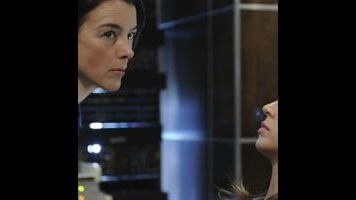Dollhouse: "Man On The Street"

So here we are, at the fabled sixth episode of Dollhouse, which everyone from creator Joss Whedon to stars Eliza Dushku and Tahmoh Penikett has hyped in interviews as the hour that takes the show to the next level. As a promotional gambit, this seems pretty risky: Does this mean that they thought the first five episodes were garbage? Or that network interference hobbled this baby in the crib? And on the other side, is there a danger to raising expectations too much going into one make-or-break episode that could fall short of the hype? (For the official answers to these and other questions, Hit Fix’s excellent critic Daniel Fienberg has a candid interview with Whedon here.)
Now that “Man On The Street” has finally arrived, the all-the-eggs-in-one-basket strategy starts to make sense, but this was one incredibly strong hour of television. I’ll grant that I’ve been kinder to the show than others—and have more or less liked every episode but the third—but there have been enough sticking points each week to leave me worried about whether the show’s concept was fundamentally untenable or whether Whedon’s inimitable voice would finally emerge. Obviously, TV is a marathon, not a sprint, so one episode isn’t going to cure the rickets or end world hunger. But to me, “Man On The Street” represents that crucial moment when a show’s potential for greatness is realized, and while that doesn’t guarantee its health down the line—on the contrary, it could easily settle right back into its above-average groove—the possibilities are exciting, especially in the hands of a great showrunner like Whedon.
To paraphrase John McCain, I’ve always felt that the fundamentals of Dollhouse are strong. As recently as last week, I wrote: “The bits of information and intrigue that have been parceled out about Dollhouse, its behind-the-scenes machinations, and Echo’s continuing self-awareness are starting to trickle into a flood. My feeling is that like Alias—the show Dollhouse most resembles, in my opinion—the week-to-week missions may vary in quality, but the master-plotting stands to be awesome.” And “Man On The Street” is all about cashing in on the master-plotting—a privilege Whedon has enjoyed on all his previous series. A lot of the little hints and question marks that have been laid down during the five previous episodes, which have been devoted heavily to standalone missions, paid off in a big way tonight. All while introducing new questions, of course.
Partly through a faux-broadcast-report conceit and partly through far more behind-the-scenes shenanigans than usual, Whedon finally starts to pull back the curtain on the Dollhouse. Turns out that ordinary citizens are aware of Dollhouse, but the place resides safely in the realm of urban legend; we can see how the ones who are absolutely (and rightly) convinced that it's real must look like paranoiacs in front of the TV camera. “One thing people will always need is slaves,” says an African-American woman. (And to the suggestion that the dolls participate willingly, she hilariously counters, “Volunteer?! You must be out of your fucking mind.”) Some recoil at the concept of Dollhouse, which amounts to human trafficking for the ultra-wealthy. And for others, the legend is an enticement to wild fantasies about ordering up the perfect person or having “Betty Grable” every night.
“Man On The Street” plunges headlong into a lot of issues and complications, but if there’s a single theme that resonated most with me, it was the fantasy part. For that, Whedon and company have called on the brilliant comedian, actor, and KFC Famous Bowl Taste-Tester Patton Oswalt to play Joel Mynor, a Bill Gates-level computer bazillionaire who calls on Echo for a kind of ritualized recreation of a moment in life he was never able to have. For maybe the first time, we finally see an active performing a specialized service that no one else on the planet could do—in this case, embodying (in mind, if not in upgraded form) Joel’s late wife, who we learn died in a car crash before he could show her their first home. By this point, Joel has become so absurdly wealthy that the whole house could “fit in [his] guest bathroom,” but obviously, a memory like that is priceless and we can see plainly through Oswalt’s stunning performance that the hole in his heart is painfully real.
And how do we find this out? Because he confesses it to Paul, who oh-by-the-way not only has his suspicions about Dollhouse’s very existence confirmed but actually comes face-to-face with Caroline/Echo, the object of his obsession. After Boyd and Joel’s bodyguards manage to sweep Echo away from Paul’s grasp, the episode pivots into a tense mano-a-mano that reminded me a little of Homicide’s famed “Three Men And Adena.”(Which was that show’s fifth episode, so the timing is right, too.) Naturally appalled by Dollhouse’s mission—and specifically, Joel’s none-too-noble intention to fuck Echo after showing her around—Paul gets a chance to do some AIG-hearing-level shaming of his adversary. But Joel punches back with maybe my favorite (and very Whedon-y) line of the night: “I’m sure I’m in serious need of some moral spankitude, but guess who’s not qualified to be my rabbi?” Joel sees right through Paul’s obsession with Caroline/Echo and calls bullshit on his Eliot Ness pose; the quest for justice ain’t the only reason he’s on the hunt.











![HBO teases new Euphoria, Larry David, and much more in 2026 sizzle reel [Updated]](https://img.pastemagazine.com/wp-content/avuploads/2025/12/12100344/MixCollage-12-Dec-2025-09-56-AM-9137.jpg)




























